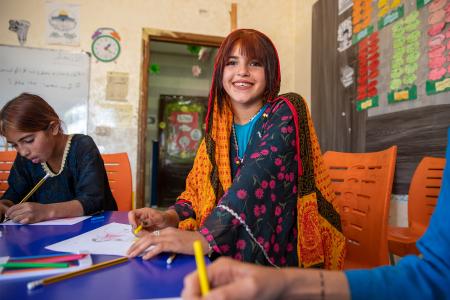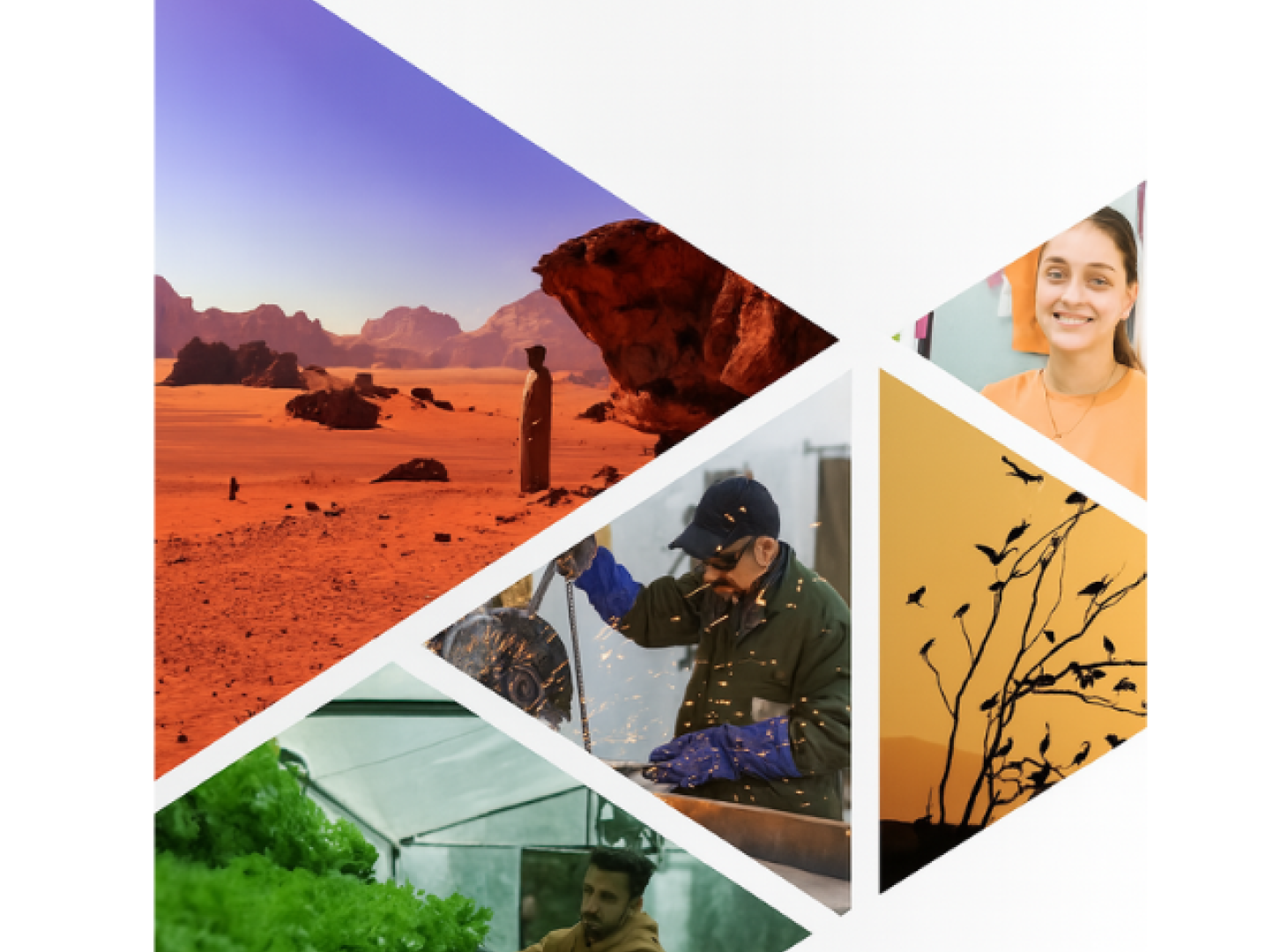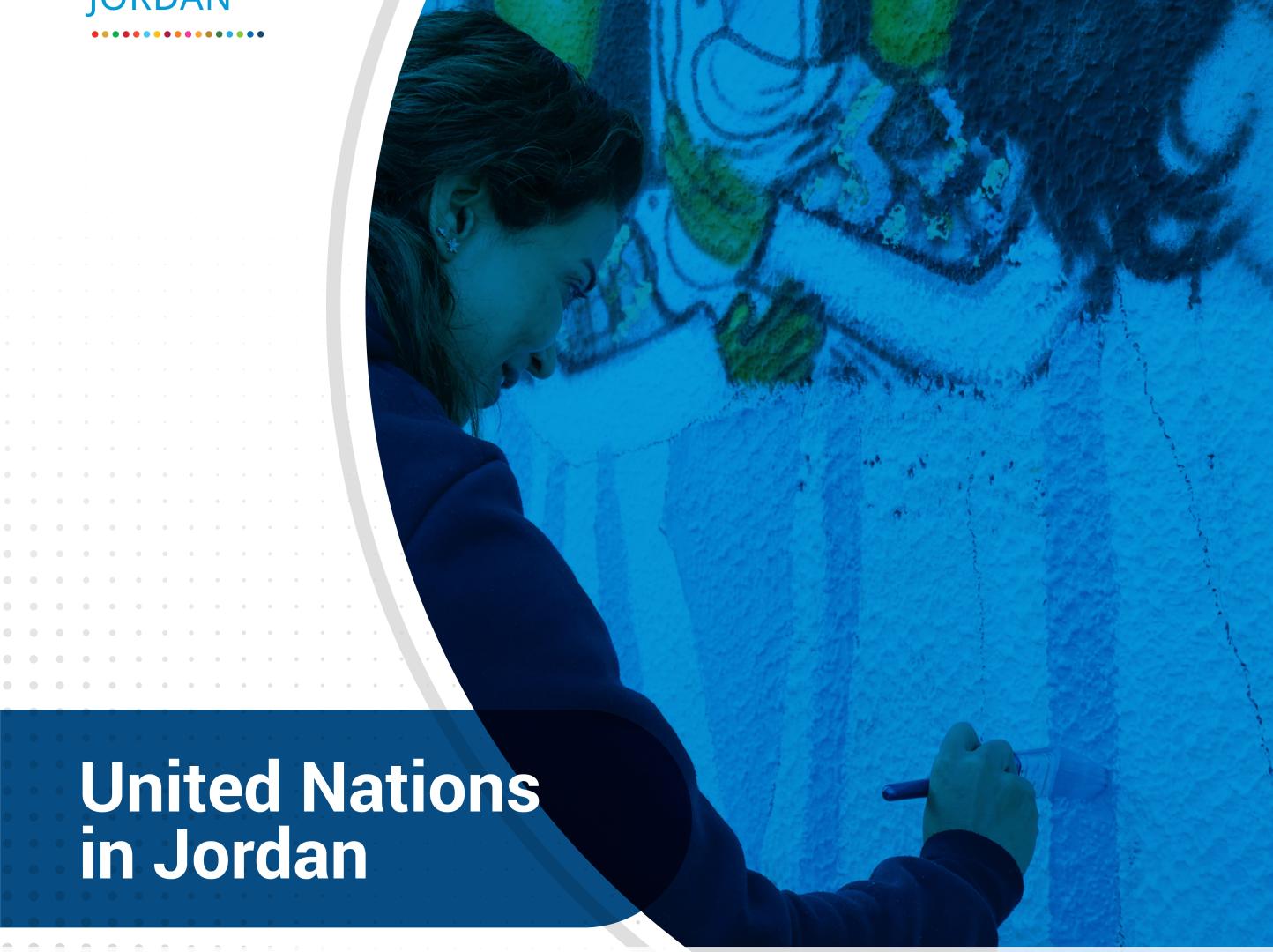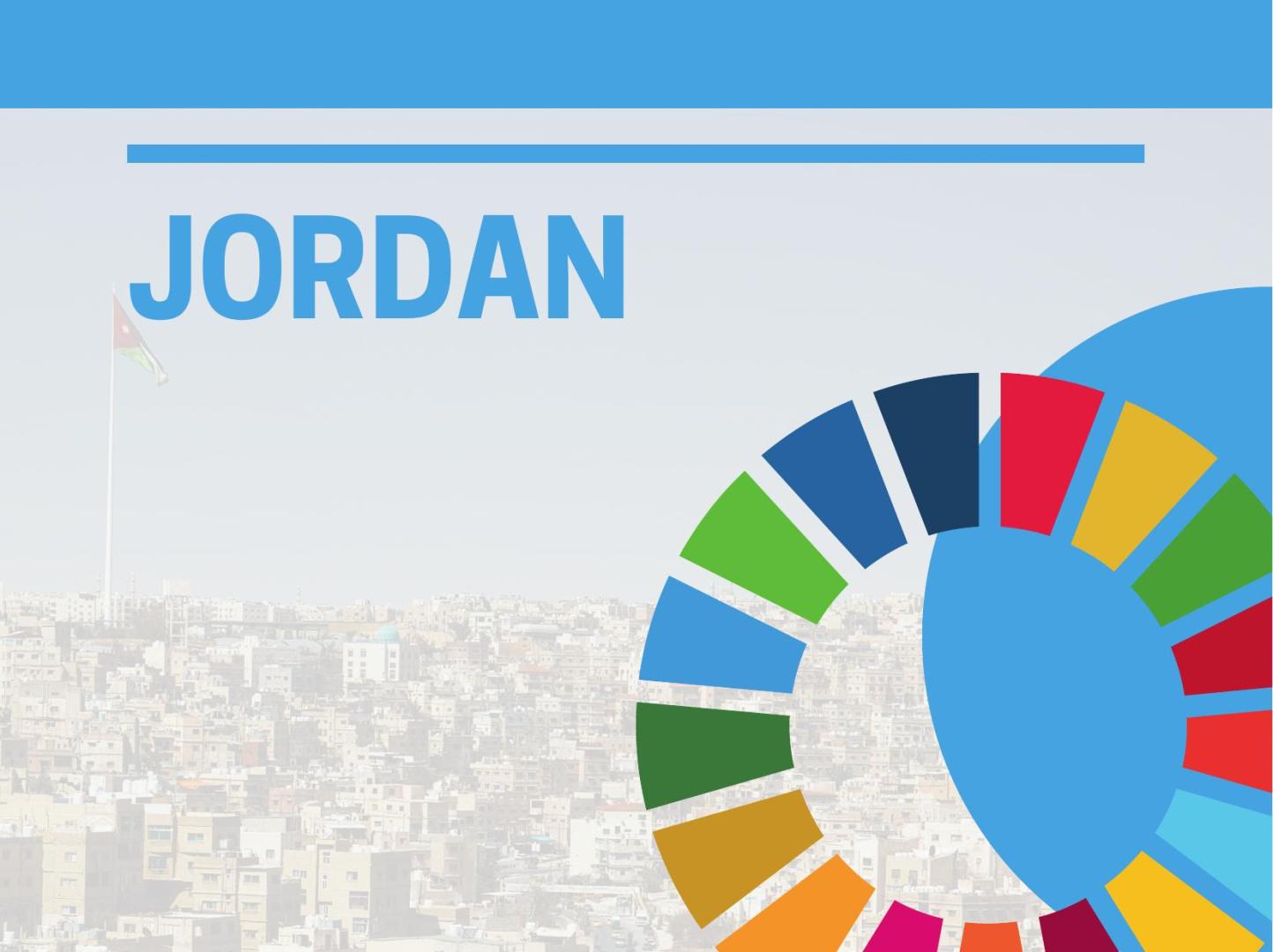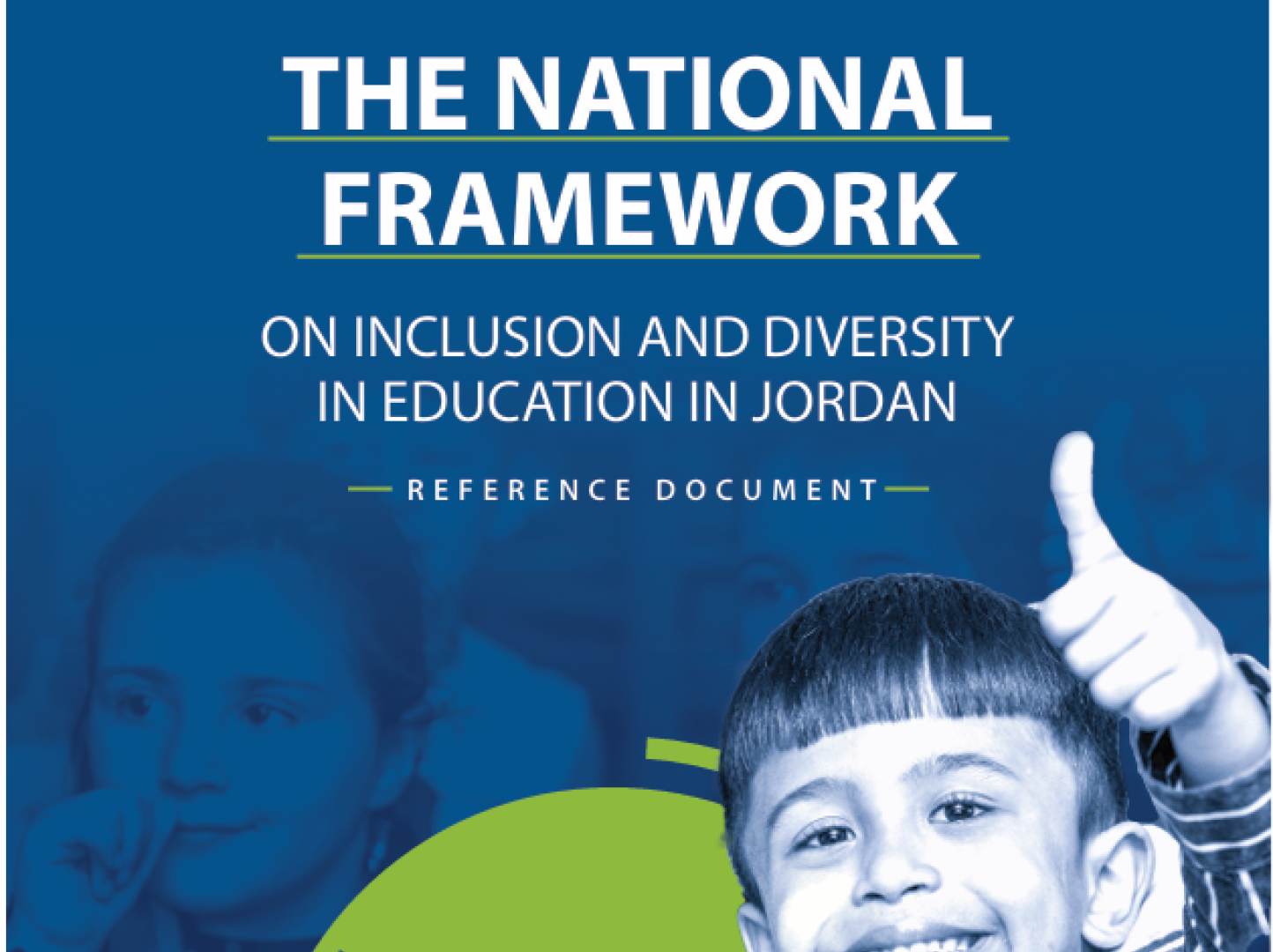Latest
Press Release
16 December 2025
Launching the Results of Three National Studies Revealing the Scale of Food Waste in Jordan
Learn more
Press Release
15 December 2025
ILO, Government of Jordan and KfW Inaugurate Community Development and Training Centre Project in Jerash
Learn more
Speech
08 December 2025
Opening Remarks by the UN Resident Coordinator in Jordan Regional Workshop on Youth Participation in Peace and Security in MENA
Learn more
Latest
The Sustainable Development Goals in Jordan
The Sustainable Development Goals are a global call to action to end poverty, protect the earth’s environment and climate, and ensure that people everywhere can enjoy peace and prosperity. These are the goals the UN is working on in Jordan:
Story
30 June 2025
Community-led Climate Actions to Boost Resilience in Jordan
Across Jordan, a quiet yet powerful transformation is underway. Communities, young leaders and women are using the power of climate action to lead the way for a greener, more equitable and resilient Jordan. From schoolyards to rooftops, communities across the country are restoring ecosystems, creating jobs and cultivating hope for the future.The UN in Jordan team is working closely with the Government and international partners to support these locally led efforts, demonstrating what inclusive climate action looks like in practice: community-focused, driven by innovation, and sustained by cooperation and collaboration.As Jordan faces an increasing number of environmental challenges, including rising temperatures, water scarcity, land degradation and biodiversity loss, these initiatives chart a path toward a greener transformation and show that climate resilience is not a distant goal but a collective journey, powered by shared purpose. Under the leadership of the UN Resident Coordinator and in line with its 2023-2027 strategic priorities, the UN in Jordan team mobilises technical expertise to support national initiatives to tackle these issues, promoting climate adaptation and building resilience at several levels. Beekeeping for climate resilience and livelihoodIn the forested hills of Jerash and Ajloun Governorates, wildfires and droughts increasingly undermine biodiversity and agriculture. One local resident, Afaf Nizami, leverages beekeeping to reverse the trend while providing opportunities for members of her community, particularly women, to boost their livelihoods. As the Chairwoman of the Al-Nashmiyya Charitable Society for Women and Child Development, Afaf has long worked to support vulnerable women and children in her community. But with the increasing frequency of wildfires, unpredictable rainfall, and extended dry spells, Afaf saw the need for a new kind of empowerment, one rooted in resilience, sustainability and nature-based solutions.Her community-based organization was selected as one of six beneficiaries of a joint initiative led by the Food and Agriculture Organization (FAO) and the Government of Japan. The initiative integrates disaster risk reduction with sustainable livelihood development in Jerash and Ajloun.Through this programme, Afaf and her colleagues received training on fire prevention, flood response, drought mitigation and beekeeping. In addition to the knowledge that Afaf acquired, she also received 90 inhabited beehives, six modern honey extractor machines, stainless steel tanks, harvesting gear and marketing tools. This equipment was everything she needed to turn the training she received into an income stream to boost her livelihood.“This isn’t just about producing honey. This is about securing a future for women-led associations, generating income and building food security in our communities. With the right tools, we are now able to launch real, sustainable products,” said Afaf.For her, beekeeping has become a symbol of what is possible when the right strategic and infrastructure support complements technical training and local know-how. Her association is now developing a community apiary, where women can learn, work and earn an income together, reclaiming economic agency while contributing to environmental restoration.The impact goes beyond Afaf’s association. Expanding on this initiative and in partnership with national authorities, two governorate-level Disaster Risk Reduction (DRR) committees were established in Jerash and Ajloun. These committees are helping integrate grassroots resilience into broader regional planning. Further, these activities revitalised efforts to strengthen ecosystem rehabilitation and sustainable land use while placing communities at the centre of climate adaptation efforts.Bringing climate action to the classroomIn the industrial city of Zarqa, two 23-year-olds—Mahdi and Ruba—are taking climate action in their community where it matters most: in classrooms with the next generation.As Youth Climate Leaders under the UN Children’s Fund (UNICEF)’s Sawn programme, the duo co-created Climate Friends, a grassroots environmental initiative aimed at educating schoolchildren about climate change through interactive games, storytelling and creative learning tools. “We targeted this age group because children are the future,” explains Ruba. “Whatever they learn at an early age stays with them, and we wanted those lessons to be about care for the Earth.”This engagement brought sustainability into classrooms in a playful and engaging way. Children learned about recycling by building toys from plastic cups. They explored concepts of biodiversity through planting seeds and water conservation by simulating rainfall in miniature ecosystems. Mahdi and Ruba aimed to send a simple yet powerful message that resonates with young students: “If we take care of the environment, the environment will take care of us.”For Mahdi, the work was deeply personal. “In Zarqa, the air quality is only getting worse. You see trash everywhere. But being part of this initiative gave me something more than frustration—it gave me hope,” he says. “Hope that youth, when united, can raise awareness, take action, and actually change things.” The Sawn programme, a partnership between the Jordanian Ministry of Youth, the Ministry of Environment and UNICEF, and which was implemented by the non-profit Generations for Peace, has engaged with youth climate leaders like Mahdi and Ruba. This initiative aims to cultivate their leadership with the right training and provide them with opportunities to participate in national and global fora on climate change. With generous support from the Kingdom of the Netherlands through the PROSPECTS partnership, these young leaders are rolling out climate advocacy initiatives across Jordan’s 12 governorates, creating a ripple effect of awareness, responsibility and change.“The children understood more than we expected,” Ruba reflects. “ They reminded us that a cleaner Jordan is possible if we start early, and we start together.”Smart innovation for water securityIn Irbid and Mafraq, where water is both life and limitation, young Jordanian innovators forge new paths toward climate resilience, bringing prototypes. Under the “Scaling Up Water Innovation for Climate Security” initiative, supported by the UN Development Programme (UNDP) and funded by the Swedish International Development Agency (Sida) through the SDG-Climate Facility, a group of visionary young entrepreneurs is proving that water scarcity can be met with ingenuity, not despair.Seven youth-led Small and Medium Enterprises (SMEs) are at the heart of this transformation. They are deploying a mix of AI-powered irrigation systems, Internet of Things (IoT) devices, hydroponic solutions, vertical gardens and green wall technologies—each tailored to Jordan’s harsh climate and fragile ecosystems. One youth founder proudly shared, “Our startup reduced water use by 20 per cent while increasing crop yield. This isn’t just about agriculture. It’s about innovation, survival and responsibility.”But the project’s reach extends far beyond these seven companies. More than 25 startups in the sustainability space were trained in financial modelling, value proposition design, and customer development. Most beneficiaries, 63 per cent, were young people under 30, making this initiative a powerful model of youth-centred, impact-driven entrepreneurship. From Irbid’s university halls to Mafraq’s farmlands, these innovations are already bearing fruit.For example, two start-ups, Smart Green and SmartWay to Innovation, are revolutionising household farming by using data to optimise water use. Other startups, Senara, Green On, and iPlant, introduced urban farming models that are redefining food production in water-scarce neighborhoods. Al-Yaqout for Agricultural Investments and KeyLife Electronics developed soil enhancement and water retention products, helping farmers grow more with less resources. Guided by the Youth 2030 strategy, the initiative also ensured long-term sustainability by training beneficiaries in system maintenance and transferring technical knowledge and ownership to the communities.Jordan’s community-led leadership is demonstrating the critical role of local action in building climate resilience. With the support of the UN in Jordan, these innovative approaches make the case that putting the community, including women and young people, in the driver’s seat of sustainable development paves the way for a prosperous, sustainable future.
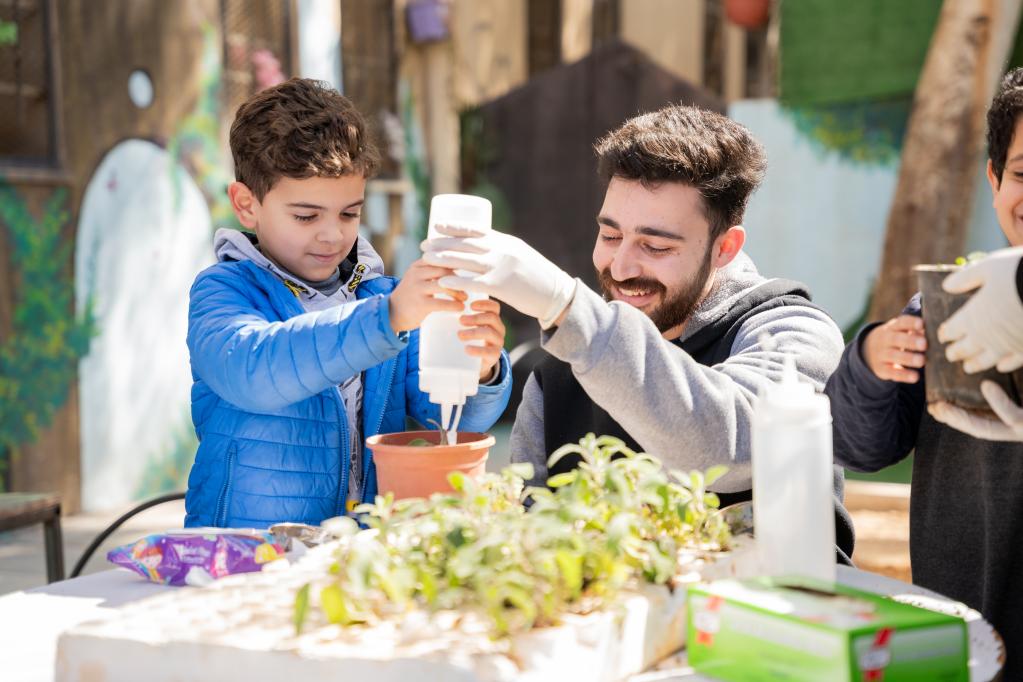
Story
10 July 2025
From dropping out to dreaming big: Ghazala’s second chance at Makani
Every year, Makani centres provide vulnerable children, including over 2,500 children from the Dom community, with safe and inclusive spaces where they learn, play and build friendships.At a UNICEF-supported Makani Centre, 13-year-old Ghazala radiates the bright and joyful energy of someone who has found a space where she belongs. “Makani is just so beautiful,” she says with a wide smile. “The facilitators are so kind to me and I learn so much here.” Ghazala lives with her parents and six siblings and is from a marginalized Jordanian minority community known as the Dom, which historically has been a nomadic group. As the family speaks Turkman at home, Arabic was difficult for her to learn - until she found the support she needed at the Makani centre. “We don’t speak Arabic at home, but here, I learned it along with mathematics and many other activities that I did,” Ghazala explains. Because of seasonal migration of the Dom community, Ghazala’s education was disrupted, and she was out of school for a few years. “I dropped out of school when I was only in Grade 2,” she recalls. “But I’ve been attending the Makani centre for many years now - I can’t even remember how young I was when I started.” A Place to Learn and BelongMakani, which means “My Space” in Arabic – is exactly that for Ghazal: a place to learn, feel safe and express herself freely. UNICEF and its partners established Makani centres across Jordan to provide vulnerable children from all backgrounds access to learning, protection, and psychosocial support in safe and inclusive environments. “Makani is not just a place for learning,” Ghazala says. “I have so much fun here. My favourite activity is painting.” And when Ghazal talks about painting, her face lights up. “Painting makes me feel so good,” she says. “Creating things out of my imagination, expressing my feelings using colours – this is the nicest thing. When I see my finished painting, I feel like all my emotions are there.” Sometimes Ghazala finds it hard to express her feelings with words - but never with colours.“I like to paint flowers, girls in dresses, and smiley faces,” she says. “I colour them like a designer! Smiley faces give me positive energy, and they make other people, who see my painting, smile too.” Creativity, Confidence, and CommunityAt Makani, Ghazala has found what every child deserves: a safe space, community of friends and trusted adults, all who help her thrive. “I have so many friends here, and it feels great,” she says. “We talk, share our thoughts and feelings, and play together. My life feels so colourful because of the things I have – my loving family, my beautiful friends, and this amazing centre where I can be myself.” The facilitators at the Makani centre have left a lasting impact on her life. “I feel safe here,” Ghazala says. “I’ve never been shouted at. The facilitators are kind and understanding. They treat me like family.” Through her time at the Makani centre, Ghazala has also gained important life skills and the confidence in how to navigate challenges that may arise. “The facilitators taught me how to stand up for myself and ask for help when I need it,” she says. “They taught me to always speak to an adult I trust, like my mom or someone at Makani centre.” A Future Full of DreamsGhazala is full of big dreams and she’s not afraid to share them. “My mom always wanted to finish her education before getting married, but she didn’t get the chance. I want to change that,” she says confidently. The Makani centre has given Ghazala the support and encouragement she needs to chase that goal. “I hope one day I can go back to school and continue learning,” she says. “Makani is helping me get there.” UNICEF is grateful for the European Union for helping us reach the most vulnerable children and adolescents with integrated services through the Makani programme in Jordan, including over 2,500 children from the Dom community.This story was originally published by UNICEF and written by AbdelMajid El-Noaimi. To learn more about UNICEF’s work in Jordan, visit the link below.https://www.unicef.org/jordan/
1 of 5
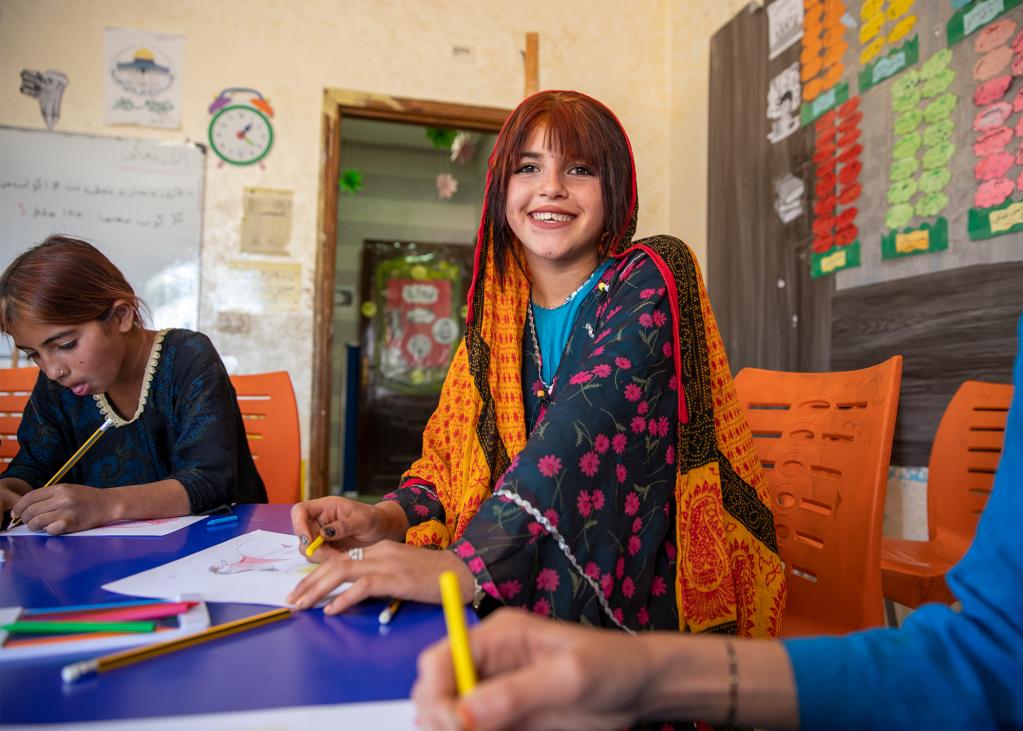
Story
06 May 2025
Leaving No One Behind: EMIS as a Path to Inclusive Education in Jordan
In today’s digital world, data is crucial for decision-making and policy development. The integration of refugee data into Jordan’s Education Management Information System (EMIS) is helping improve equal access to quality education for all students. This initiative, supported by UNESCO and funded by the European Union through the “Technical Assistance to Support Jordan’s Ministry of Education’s EMIS Platform for Enhanced Evidence-Based Decision Making” project, ensures that refugees are accessing and learning in the national education system. Jordan currently hosts over 620,000 refugees registered with UNHCR[1]. Previously, registering refugee children in Jordanian schools required multiple documents, including a UNHCR Asylum Seeker Certificate, a UNHCR refugee certificate, a passport, a birth certificate, and either a Ministry of Interior (MoI) card for Syrians or another form of identification, such as an ID card or the number provided by border authorities on the passport. Parents often had to visit schools and administrative offices repeatedly, delaying enrollment. Additionally, school administrators manually verified whether a non-Jordanian student was a refugee by checking their UNHCR Asylum Seeker Certificate each year, consuming valuable time and resources. Amira, a Somali refugee who arrived in Jordan in 2013, and Bar’a, an Iraqi refugee living in Jordan since 2012, both faced challenges in enrolling their children in school. Amira had to submit various documents, including Asylum Seeker Certificate, a passport, and a personal identification number—such as the number issued by border authorities on the passport— every year, making the process stressful and time-consuming, Now, with the alignment between EMIS and UNHCR database, all she needs is her UNHCR asylum seeker certificate for school enrollment. Similarly, Bara’a previously had to renew her son’s asylum seeker certificate, annually, visiting both UNHCR and the school for verification. With EMIS’s automated validation process, her son’s status is verified electronically in seconds, eliminating the risk of lost documents and saving time.The updates to Jordan’s EMIS platform simplify the verification of the protection status of the refugee automating the process. Instead of requiring parents to submit multiple documents, EMIS instantly validates the necessary information, reducing administrative burdens and allowing for faster student registration. Ensuring a valid Asylum Seeker Certificate number. Remains essential, as it serves as proof of refugee status and enables students to be exempted from school fees.This automation ensures that refugee students can be enrolled in school promptly, avoiding delays and disruptions in their education. It also frees up teachers to focus on their primary task—teaching.Beyond efficiency, EMIS enhances coordination between the Ministry of Education, UNHCR, and relevant partners, ensuring educational resources target the most vulnerable students It provides policymakers with reliable data to better understand refugee students’ needs, track their educational progress, and address learning gaps, ensuring they receive the necessary support to succeed academically. By minimizing data entry errors and improving inter-agency coordination, this initiative reinforces Jordan’s leadership and commitment to inclusive education. Few refugee-hosting countries have effectively disaggregated basic education data by protection status in their national EMIS. Jordan is leading the way, offering valuable insights for other countries seeking to replicate these efforts. Through the integration of refugee data into EMIS, Jordan is making important strides toward achieving Sustainable Development Goal (SDG) 4: ensuring inclusive and equitable quality education for all. This collaboration and commitment to innovation demonstrate how data-driven solutions can create a future where every child has the opportunity to learn and thrive—without delay. -END- “The Technical assistance to support Jordan’s Ministry of Education’s EMIS platform for enhanced evidence-based decision making” was jointly designed with the MoE, UNESCO and the European Union in 2022 to support the MoE’s strengthening of its enabiling environment for OpenEMIS, through the operationalization of its EMIS Policy, while also supporting the MoE to migrate their EMIS towards a sustainable and robust hosting solution. In addition, enhancements to Jordan’s EMIS were done to improve data quality, accuracy and utilization, including enhanced data on refugees.
1 of 5
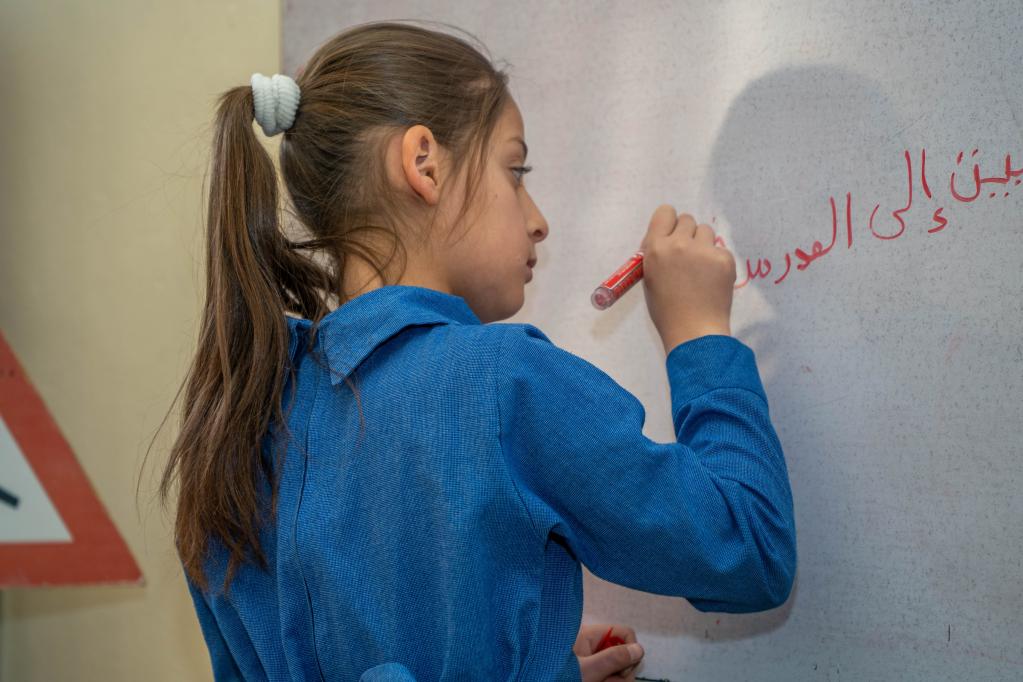
Story
03 February 2025
The Lifeline of Water: Asmahan's story in Za’atari Camp
In Za’atari camp, Asmahan, an Arabic teacher at a Makani centre, lives with her husband and six children. Their journey to Jordan began in 2013 after fleeing the war in Syria.The early days in the camp were tough. Asmahan recalls the daily struggle for clean water. "We had to carry water home in buckets and queue every day at public taps," she says. The lack of privacy at public washrooms made life even harder.Things began to change with UNICEF's intervention. The installation of water and wastewater networks transformed their living conditions. "These networks have allowed us to have water in our own houses, toilets, and kitchens, giving us a sense of normality," Asmahan explains. Living in Za’atari has taught Asmahan and her family the true value of clean water. "Unlike Syria, water here is very limited, and if we are not careful, we will run out of water before the next round of water distribution," she says. Most of their water is used for hygiene, a crucial aspect of camp life.Asmahan has instilled the importance of water conservation and hygiene in her children. "Thankfully, all of them have learned well, and we never run out of water as a result," she proudly shares.Her daughter Shahd, though shy, demonstrates how her teachers and mother taught her to wash her hands properly, a small but significant step in maintaining health in the camp.Asmahan's story is a powerful testament to the resilience and determination of families in Za’atari. It highlights how access to clean water, made possible through UNICEF’s support, is critical in improving their lives.Za’atari camp, home to over 78,500 residents, benefits from UNICEF's water, sanitation, and hygiene services. Established in 2019, these household-level systems ensure stable access to clean water, safe sanitation, and reduced operational costs, enhancing residents' quality of life.By AbdelMajid Al-Noaimi, UNICEF JordanFor more information about UNICEF's work in Jordan, please visit their official website:UNICEF Jordan
1 of 5
Story
12 December 2024
Building a stable future – Eyad Al Merjawi’s journey to decent work and social protection in Jordan
ZARQA (ILO News) — Eyad Al Merjawi, a 41-year-old refugee from Syria, has called Jordan home since 2013. Settling in the city of Zarqa, 30 km northeast of Amman, Eyad struggled to find work without the necessary permits—an obstacle to many refugees. Eyad’s journey took a positive turn, with support from Jordan’s Social Security Corporation (SSC), jointly with the International Labour Organization (ILO) and UNHCR, the UN Refugee Agency, under the PROSPECTS partnership funded by the Government of the Netherlands.The Start of the Journey Eyad's journey to stable employment in Jordan began with one essential step: securing his documentation through UNHCR’s registration system, a key tool in providing refugees with access to rights and services. In Jordan, without proper registration through UNHCR, refugees cannot access basic services such as public healthcare, education, or even employment opportunities
For Eyad, obtaining his work permit was a turning point. "It was not easy at first; I faced many obstacles just to get the permits needed for employment," he recalls. Eyad first obtained an asylum seeker certificate, which enabled him to secure his work permit and to legally work as a butcher in a shop in Zarqa. Support that makes a difference While having a job is important for ensuring financial stability for refugees, obtaining social security coverage is equally crucial to protect them from potential lifecycle risks. To help refugees better understand the social security system, SSC and UNHCR conducted a series of awareness raising activities in refugee camps and host communities. Eyad learned about the Estidama++ programme which supports vulnerable workers in enrolling in social security schemes, providing them with essential protection in navigating the uncertainties of life. Estidama++ is a social protection initiative in Jordan aimed at helping vulnerable workers, including refugees, access social security. Supported by Jordan's Social Security Corporation (SSC) and with technical support from the ILO, the programme provides subsidies to cover social security contributions, making benefits such as injury insurance, maternity leave, and pensions more accessible to informal workers in sectors like agriculture and small businesses. This support helps lower barriers to participation, creating a more inclusive and resilient workforce across Jordan. Through UNHCR's outreach, Eyad learned how Estidama++ could provide vital protections, such as coverage for work-related injuries. This knowledge empowered him to enrol in the programme, reinforcing the critical role that accessible information plays in helping refugees secure a safer and more stable future. Eyad remains hopeful for the future and is optimistic about the programme’s potential extension. “I hope it continues, not just for me but for others who need it,” he says. For Eyad, Estidama++ is more than a programme—it’s a path to self-reliance, giving refugees like him a chance to rebuild their lives with dignity and hope by securing formal and stable employment. A positive impact on refugees After enrolling in the Estidama++ programme in December 2023, Eyad has received a 100 JOD (approximately 140 USD) income support every three months. In addition, his employer, the shop owner, receives 30 JOD per month to help cover a significant portion of the shop’s social security contribution on Eyad’s behalf. This financial support has provided Eyad’s family of five with a much-needed safety while made the shop owner more inclined to retain Eyad as an employee, knowing that part of the social security cost is covered. Hope for the Future "Every day when I go to my job, I feel safe," Eyad shared. "Knowing that, even if something were to happen to me that would stop me from working, I know my family is protected through the programme." This added layer of security is not just a financial boost for Eyad and his family but also a key factor in strengthening his employment stability, showcasing how Estidama++ is improving lives and supporting vulnerable workers. Creating opportunities amid challenges Eyad is among eight thousand workers who have enrolled in social security in Jordan, thanks to the Estidama++ programme. This crucial support encourages small businesses to hire refugees like Eyad. His story is a testament to the resilience and the power of inclusive initiatives that foster economic and social stability for refugees in Jordan. *Contributed by ILO Jordan
For Eyad, obtaining his work permit was a turning point. "It was not easy at first; I faced many obstacles just to get the permits needed for employment," he recalls. Eyad first obtained an asylum seeker certificate, which enabled him to secure his work permit and to legally work as a butcher in a shop in Zarqa. Support that makes a difference While having a job is important for ensuring financial stability for refugees, obtaining social security coverage is equally crucial to protect them from potential lifecycle risks. To help refugees better understand the social security system, SSC and UNHCR conducted a series of awareness raising activities in refugee camps and host communities. Eyad learned about the Estidama++ programme which supports vulnerable workers in enrolling in social security schemes, providing them with essential protection in navigating the uncertainties of life. Estidama++ is a social protection initiative in Jordan aimed at helping vulnerable workers, including refugees, access social security. Supported by Jordan's Social Security Corporation (SSC) and with technical support from the ILO, the programme provides subsidies to cover social security contributions, making benefits such as injury insurance, maternity leave, and pensions more accessible to informal workers in sectors like agriculture and small businesses. This support helps lower barriers to participation, creating a more inclusive and resilient workforce across Jordan. Through UNHCR's outreach, Eyad learned how Estidama++ could provide vital protections, such as coverage for work-related injuries. This knowledge empowered him to enrol in the programme, reinforcing the critical role that accessible information plays in helping refugees secure a safer and more stable future. Eyad remains hopeful for the future and is optimistic about the programme’s potential extension. “I hope it continues, not just for me but for others who need it,” he says. For Eyad, Estidama++ is more than a programme—it’s a path to self-reliance, giving refugees like him a chance to rebuild their lives with dignity and hope by securing formal and stable employment. A positive impact on refugees After enrolling in the Estidama++ programme in December 2023, Eyad has received a 100 JOD (approximately 140 USD) income support every three months. In addition, his employer, the shop owner, receives 30 JOD per month to help cover a significant portion of the shop’s social security contribution on Eyad’s behalf. This financial support has provided Eyad’s family of five with a much-needed safety while made the shop owner more inclined to retain Eyad as an employee, knowing that part of the social security cost is covered. Hope for the Future "Every day when I go to my job, I feel safe," Eyad shared. "Knowing that, even if something were to happen to me that would stop me from working, I know my family is protected through the programme." This added layer of security is not just a financial boost for Eyad and his family but also a key factor in strengthening his employment stability, showcasing how Estidama++ is improving lives and supporting vulnerable workers. Creating opportunities amid challenges Eyad is among eight thousand workers who have enrolled in social security in Jordan, thanks to the Estidama++ programme. This crucial support encourages small businesses to hire refugees like Eyad. His story is a testament to the resilience and the power of inclusive initiatives that foster economic and social stability for refugees in Jordan. *Contributed by ILO Jordan
1 of 5
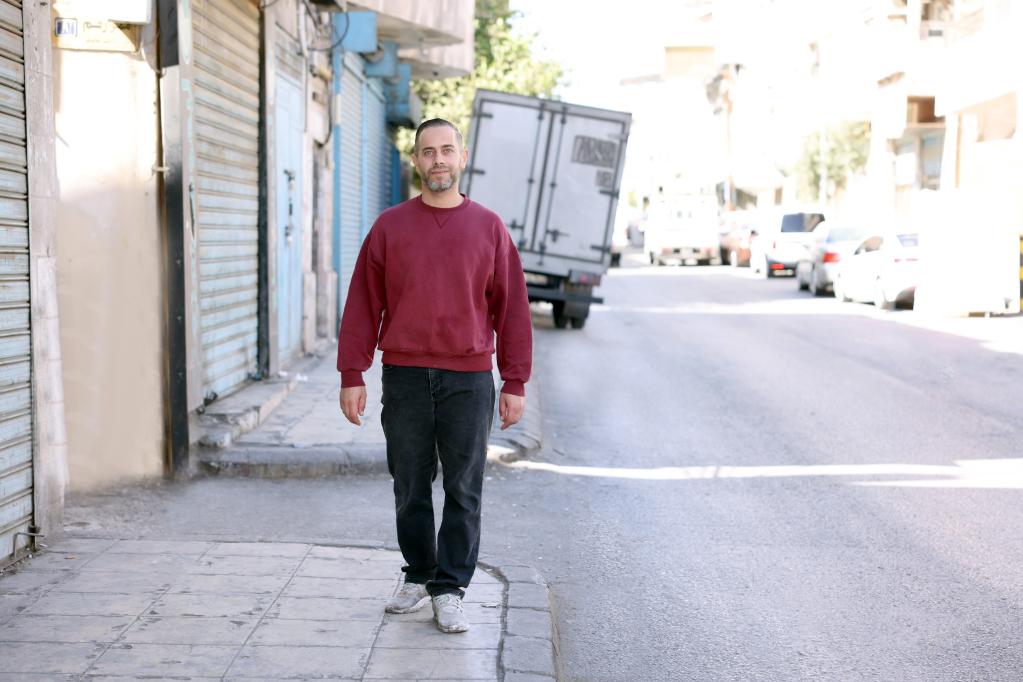
Story
09 December 2024
Empowering through nutrition: chef Manal Alalem connects with women of Zaatari camp
Walking through the dusty paths of the Zaatari refugee camp, the sounds of children playing and the smell of freshly baked bread filled the air—a testament to life persisting despite hardship. For Chef Manal Alalem, this wasn’t her first visit to Zaatari. Still, each journey to this sprawling camp carried a new depth of emotion and purpose. As a WFP Goodwill Ambassador in Jordan, she has witnessed firsthand the resilience of Syrian refugees navigating the challenges of displacement. This time, her visit focused on connecting with several women who benefit from WFP’s monthly food assistance and have participated in nutrition awareness sessions for pregnant and breastfeeding mothers.Manal’s morning began in one of the camp’s community kitchens, where a group of women sat in a circle, recipe books and educational fact cards in hand. The session, led by a WFP nutritionist, emphasized practical tips for improving family diets using simple and affordable ingredients. Holding up one of the books, Manal explained how making informed food choices could transform lives. “Food is more than just survival—it’s a way to nurture, heal, and empower,” she shared with the women, her voice carrying the warmth of someone who deeply cares. Manal then invited the group to join her in preparing a communal meal using recipes from the book. As they cooked, the conversation flowed naturally, creating a space for the women to share parts of their experiences. Among them was Fatima, a mother of seven, whose story embodied the hardships and triumphs faced by many in the camp.Fatima, now in her forties, arrived at Zaatari in 2014 with her husband and children after fleeing the Damascus suburbs. Two of her daughters were born in the camp, and two others are now married with children. Her family’s life back home revolved around agriculture, but in Zaatari, Fatima found herself navigating an entirely new reality. “When I first came here, I relied on the knowledge passed down from my mother and relatives about feeding babies and caring for myself during pregnancy,” Fatima shared with Manal as she stirred a pot of lentils, rice and spinach.Later, after the meal, Fatima sat with Manal to share more of her journey. “Much of that advice turned out to be wrong—or even harmful,” she said, explaining how WFP’s nutrition awareness sessions had opened her eyes. “I used to think giving honey to my babies would make them strong,” she admitted. “But I learned that it can be dangerous before they turn one. Now, I feel confident and safe in my choices.”Manal was visibly moved by Fatima’s story, adding: “You’ve not only transformed your own family’s health but become a teacher for others,” she said, smiling. Fatima nodded, explaining how she now shares this knowledge with her daughters, neighbours, and friends, spreading positive change throughout the camp community. Nearby, Hamida, a single mother of three, was busy arranging ingredients for a vegetable stew. During the cooking session, Hamida shared how she had struggled with anaemia for years, a condition exacerbated by the limited food options available to her family. However, she said the nutrition awareness program had taught her how to balance meals. “I never thought food could change so much,” Hamida told Manal. “I started replacing expensive ingredients with affordable ones that are just as nutritious. For example, I learned to use lentils instead of meat in some dishes. My anaemia improved, and I can see the difference in my blood test results.”Later, in a quieter moment after the session, Hamida spoke more about the challenges her family faces. “The monthly food assistance has been reduced for over a year, and it’s hit us hard,” she said. “But I’ve learned to adapt and make the most of what we have. I feel confident now when purchasing food for my kids, knowing what to introduce on the table.”Hamida’s message to other women was clear and adamant: “Improve your knowledge. Look for correct information and leave behind misconceptions and harmful cultural practices, especially those related to food intake. It has a direct effect on your family’s health.”Listening to these stories, Manal was reminded of the immense challenges refugees face, especially in camp environments where resources are scarce. Yet, the resilience and ingenuity of women like Fatima and Hamida stood as a beacon of hope. “Your strength inspires me,” she told them as they gathered to serve the meal they had prepared together.The session ended with laughter and shared plates, but the realities of camp life lingered in Manal’s mind as she walked back through Zaatari’s winding paths. She reflected on the urgent need for increased support to meet the needs of vulnerable families.At the heart of these efforts is WFP’s partnership with the King Salman Humanitarian Aid and Relief Centre (KSrelief), whose contributions, alongside other generous donors, help sustain WFP’s monthly food assistance for thousands of refugees. To improve the nutritional status of families receiving monthly assistance, WFP is integrating a nutrition awareness component focusing on families with specific needs, such as pregnant and breastfeeding women and children aged 6–23 months. Through training and educational tools, WFP is raising awareness about the importance of diverse, nutritious diets to address these needs. However, with refugee needs outpacing available resources, Manal emphasized the importance of continued collective action to address the gaps. “Every meal shared, every piece of knowledge passed on—it all makes a difference,” she said. “But we must ensure these families have the support they need not only to survive, but to thrive.”As she departed Zaatari, Chef Manal carried with her stories of struggle, hope, determination, and the power of community—proof that, even in the most challenging circumstances, the human spirit remains unbreakable.
1 of 5
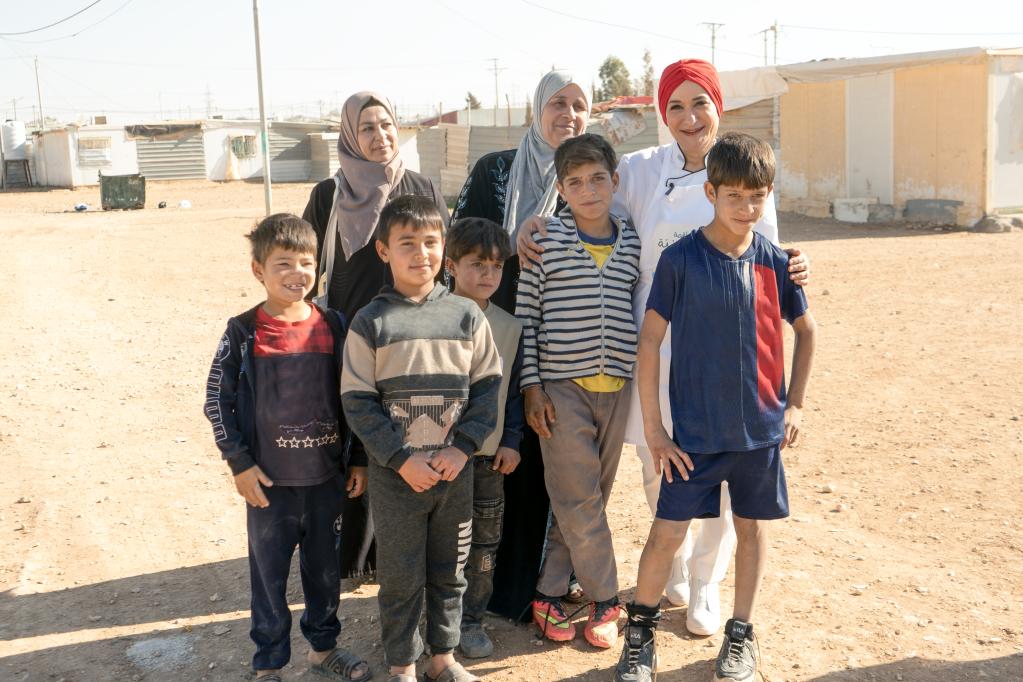
Press Release
16 December 2025
Launching the Results of Three National Studies Revealing the Scale of Food Waste in Jordan
On behalf of H.E. the Minister of Agriculture / Deputy Chairperson of the Higher Council for Food Security, Dr. Sa’eb A. Khresat, the Secretary General of the Ministry of Agriculture, Eng. Mohammad Al-Heari , together with the Director-General of the Department of Statistics, Dr. Haider Fraihat, and in the presence of Resident Representative and Country Director of the World Food Programme in Jordan, Ms. Antonella D’Aprile, launched the results of three national studies measuring food waste in Jordan. These studies provide, for the first time, accurate national-level data across key sectors, including households, restaurants, hotels, and hospitals.For his part, the Secretary General of the Ministry of Agriculture noted that this study represents a milestone in Jordan’s journey toward strengthening its food security. For the first time, Jordan now has accurate national data on the scale of food waste, enabling a shift from estimates and perceptions to evidence-based planning. He emphasized that these findings will support the formulation of more effective policies and help direct investments toward practical solutions that reduce food loss and mitigate its economic and environmental impacts.The Director General of the Department of Statistics highlighted that the results show households are the largest contributors to food waste. A study conducted on the household sector revealed that the annual per-capita food waste in Jordan is approximately 81.3 kg across Jordan, with the highest levels recorded in Zarqa Governorate and the lowest in Ajloun. The results indicated that the main causes of household food waste are consumption patterns, purchasing habits, and weak food-management practices within households. He noted that this calls for future national studies to monitor purchasing and consumption behaviors in greater detail.The Resident Representative and Country Director of the World Food Programme (WFP) in Jordan, Antonella D’Aprile, added: “The launch of Jordan’s first official food waste figures represents a significant milestone that will help guide evidence-based policymaking and raise public awareness on food waste. The World Food Programme is proud to provide its technical expertise in support of the implementation of the National Food Security Strategy 2021–2030. By addressing this critical data gap, Jordan is paving the way for stronger interventions and more efficient use of its limited resources.In parallel, a separate study was conducted on a sample of 896 restaurants across various governorates. The results showed that food waste generated by the restaurant sector amounted to 12,291 tons. The study revealed that the highest levels of waste occur during the preparation and processing stages, contrary to the common perception that the serving stage accounts for the largest share. The main drivers of food waste in this sector were identified as poor planning and procurement management, limited recycling capacity, and the behaviors of both customers and staff. Geographically, Amman, Irbid, and Zarqa governorates recorded the highest volumes of food waste, reflecting the high concentration of restaurants in these areas.AL Fraihat further indicated that the total volume of food waste generated in the hotel sector during 2024 amounted to approximately 3,739 tons. By food category, waste was distributed as follows: vegetables accounted for 29%, wheat and wheat-based products for 13.2%, and rice for 13.1%. In terms of waste stages, the highest levels were recorded during the serving stage at 44.4%, followed by the preparation and processing stage at 37.3%, and finally the pre-preparation stage at 18.3%. The study showed that the primary drivers of food waste in the hotel sector were staff behaviors, followed by limited recycling options, while customer behavior accounted for the smallest share.With regard to the hospital sector, Dr. Haider Fraihat explained that the study covered a sample of four hospitals from both the public and private sectors. The findings indicated that total annual food waste in hospitals amounted to approximately 1,302 tonnes. The public sector accounted for the largest share, representing 81% of total food waste, compared to 19% generated by private-sector hospitals, a difference largely attributable to higher occupancy rates in public hospitals. These results underscore the need for targeted interventions to improve food planning, regulate portion sizes, and develop digital pre-ordering systems, thereby reducing food waste and enhancing efficiency in resource management.In addition, the Director-General of the Department of Statistics emphasized that these figures will be integrated into the national statistical system to serve as an official reference for decision-makers and researchers. He also affirmed the Department’s commitment to further developing monitoring and tracking tools, ensuring that these data become a solid foundation for more accurate and effective national programmes.In conclusion, H.E. Eng. AL-Heari commended the effective partnership with the World Food Programme and its technical support, which contributed to the completion of this study in line with the highest international standards. He emphasized that WFP’s support to Jordan has extended beyond the preparation of this study to include broader assistance to national efforts aimed at strengthening food security and supporting the Kingdom’s transition toward more sustainable and resilient food systems capable of withstanding growing regional and global challenges.
1 of 5
Press Release
15 December 2025
ILO, Government of Jordan and KfW Inaugurate Community Development and Training Centre Project in Jerash
The International Labour Organization (ILO), together with the Government of Jordan and the German Development Bank (KfW), today inaugurated the Community Development and Training Centre around the Wildlife Reserve Project in Al-Ma‘rad Municipality, Jerash Governorate, reinforcing national efforts to promote decent work, local development, and environmentally sustainable livelihoods.The inauguration ceremony brought together H.E. Eng. Walid Al-Masri, Minister of Local Administration; H.E Nidal Ayasrah Secretary General of Ministry of Culture, senior representatives from relevant line ministries; Dr. Assia Al Dhabi Senior Portfolio Manager German Development Bank (KfW); Amal Mowafy, ILO Country Coordinator in Jordan; municipal leadership; local authorities; community representatives; and workers who directly contributed to the implementation of the project.Implemented through the ILO’s Employment-Intensive Investment Programme (EIIP), the project forms part of Jordan’s broader transition from short-term humanitarian responses toward sustainable, labour-based development approaches that link employment creation with skills development, institutional strengthening, and the creation of durable community assets.Opening the event, Eng. Mahmoud Al Khalwdeh Head of Al-Ma‘rad Municipality Committee highlighted the project’s importance for the local community, emphasizing its contribution to improving municipal services, creating employment opportunities for residents, and strengthening the municipality’s capacity to manage and sustain public assets.In his remarks, H.E. Eng. Walid Al-Masri, Minister of Local Administration, underscored the Government of Jordan’s commitment to empowering municipalities as key drivers of inclusive development.“This project reflects our national direction toward strengthening local governance and enabling municipalities to play a central role in job creation and service delivery,” said Al-Masri. “Labour-based development approaches allow us to respond to community needs while investing in people and building sustainable assets that serve local priorities.”“Locating this project in the vicinity of a wildlife reserve demonstrates how development can be designed in harmony with nature,” a Ministry representative said. “Such initiatives contribute to protecting natural resources while creating green and sustainable livelihood.” For the ILO, the project represents a people-centred development model that places decent work at the heart of local investment. Amal Mowafy, ILO Country Coordinator in Jordan, stated “This inauguration is not merely the opening of a new facility; it is a celebration of collective effort, genuine partnership, and the hard work of community members who made this achievement truly their own.”She added, “What distinguishes this project is that it placed people at the heart of the development process. Through the Employment-Intensive Investment Programme, women and men accessed dignified work opportunities, gained practical skills, built their capacities, and strengthened their sense of dignity and belonging—while contributing to an asset that will continue to serve the local community for years to come”.Representing the German Development Bank, Assia Al-Dahabi reaffirmed Germany’s long-standing partnership with Jordan and the ILO.“Through our cooperation with the Government of Jordan and the ILO, we support development models that combine job creation with institutional strengthening and environmental sustainability,” she said. “Projects such as this demonstrate how integrated local development can deliver lasting benefits for communities.”A representative of EIIP workers also addressed the audience, sharing how participation in the project provided not only short-term employment, but also practical experience, confidence, and pride in contributing to a community asset.A distinctive feature of the project is its location in the vicinity of a wildlife reserve, reflecting an integrated approach that links employment creation, environmental protection, and sustainable local livelihoods. The newly established training centre is expected to serve as a hub for skills development, community engagement, and future economic opportunities.The event concluded with a ribbon-cutting ceremony and an on-site tour, during which participants engaged directly with workers and reviewed the completed works.The inauguration reaffirmed that the most lasting impact of employment-intensive programmes lies not only in the infrastructure delivered, but in the capacities built, institutions strengthened, and partnerships reinforced. Through continued collaboration between the Government of Jordan, the ILO, and KfW, such initiatives continue to advance inclusive and sustainable development across the Kingdom.
1 of 5
Press Release
30 November 2025
Switzerland and UNICEF Partner to Improve Water and Sanitation Services for Vulnerable Children in Jordan
The Embassy of Switzerland in Jordan and UNICEF signed a new agreement to improve access to safe water, sanitation, and hygiene (WASH) services for vulnerable children and families in Syrian refugee camps and host communities in Jordan.With a total contribution of CHF 2.85 million (USD 3.5 million), Switzerland reaffirms its long-standing partnership with UNICEF and its commitment to supporting the Government of Jordan in advancing child rights and improving access to essential services. The new funding will focus on strengthening national systems that provide sustainable, climate-resilient WASH services in both host communities and refugee settings.“Switzerland has been a trusted partner in our efforts to ensure every child in Jordan grows up in a safe and healthy environment,” said Shairose Mawji, UNICEF Deputy Representative to Jordan. “This renewed collaboration will help us strengthen WASH systems and improve the lives of the most vulnerable children and families in refugee camps and host communities in Jordan.”Eileen Hofstetter, Head of Cooperation at the Embassy of Switzerland said “Switzerland remains firmly committed to supporting Jordan in addressing the needs of Syrian refugees in the camps, as well as advancing development efforts for host communities. Through a range of initiatives in WASH, education, protection, and employment, we continue to stand with Jordan in promoting dignity, resilience, and sustainable opportunities for all.”At a time when Jordan continues to face increasing pressure on its resources, this contribution reinforces the shared commitment of Switzerland and UNICEF to supporting the country’s priorities in WASH services. The renewed partnership builds on years of collaboration to strengthen national systems, enhance resilience, and advance progress toward the Sustainable Development Goals.
1 of 5
Press Release
29 November 2025
FAO and Spain conclude project enhancing food security and water resilience in Ma’an and Karak
The Food and Agriculture Organization of the United Nations (FAO) in Jordan, in partnership with the Government of Spain through the Spanish Agency for International Development Cooperation (AECID), today marked the successful conclusion of the project: “Enhancing food security through adaptation to climate change and water scarcity in Ma’an and Karak Governorates.”The closing ceremony was held in Petra under the patronage of H.E. Dr. Saeb Khreisat, Minister of Agriculture, and in the presence of H.E. the Spanish Ambassador to Jordan, Mr. Miguel de Lucas, alongside representatives from the Petra Development and Tourism Regional Authority, project beneficiaries, and various government and stakeholder partners.The project’s core objective was to significantly improve the food security and livelihoods of vulnerable rural communities in Ma’an and Karak Governorates, while simultaneously contributing to vital water conservation through sustainable management practices. The project focused on empowering local rural communities suffering from poverty through direct capacity building and the provision of essential agricultural tools.On behalf of the Minister of Agriculture, Professor Ibrahim Al-Rawashdeh, Director General of the National Agricultural Research Center , stated, "We affirm our unlimited support for agricultural modernization pathways, enhancing the capacity of our national institutions to face climatic challenges, and empowering farmers by providing them with modern tools and technologies, in alignment with the Supreme Royal Directives to prioritize food security and enhance the efficiency of natural resource utilization. The conclusion of this project, in collaboration with the FAO and the Spanish Government, is a tangible example of the impact of strategic partnerships in improving the livelihoods and increasing the income of small farmers."The project delivered tangible, high-impact results directly benefiting farmers and communities. FAO Representative in Jordan, Eng. Nabil Assaf, underscored the long-term vision of the intervention, stating, “This successful collaboration with the Government of Spain and the Ministry of Agriculture demonstrates FAO’s deep commitment to building resilient and sustainable agri-food systems in Jordan. By focusing on adapting to climate change and enhancing local water management, we are empowering vulnerable rural communities to secure their future livelihoods.”The achievements included providing cash grants to build 30 rainwater harvesting wells across Ma’an and Karak. The collected water is utilized directly for farming and irrigation, bolstering local water resources and minimizing irrigation costs for small and medium-sized farmers. Furthermore, grants facilitated the establishment of 8 innovative Hydroponic systems, enabling beneficiaries to produce high-value crops year-round, generate new value chains, and sell their products in local markets. To enhance energy resilience, the project supplied and installed 18 Photovoltaic Solar Panel systems. This investment significantly reduced energy costs for local farmers, enhanced their livelihoods, and ensured the sustainable use of natural resources. Finally, capacity building was a central pillar, with the project successfully delivering 10 Farmer Business Schools that trained 50 farmers in Ma’an and Karak on modern farm management techniques to improve their income generation and financial sustainability.H.E. Mr. Miguel de Lucas, the Spanish Ambassador to Jordan, highlighted, “Today, we celebrate not an end but a beginning. The systems installed, the capacities built, and the partnerships strengthened will continue delivering impact long after this ceremony. Spain remains firmly committed to supporting Jordan in its efforts to build resilient rural communities and to protect its precious natural resources.”The closing ceremony celebrated the joint efforts of all partners and affirmed a shared commitment to supporting Jordan’s most vulnerable communities in achieving self-reliance and environmental sustainability.
1 of 5
Press Release
19 November 2025
الاستثمار في المستقبل: اليونيسف وبنك الاتحاد ينظمان معرض الوظائف الخضراء لربط الشباب بالوظائف المستدامة
نظّمت منظمة الأمم المتحدة للطفولة (اليونيسف)، بالشراكة مع بنك الاتحاد ومركز تطوير الأعمال (BDC)اليوم،معرض الوظائف الخضراء في الجامعة الهاشمية. يهدف الحدث إلى ربط الشباب بفرص عمل محتملة ضمن الاقتصاد الأخضر، ودعم انتقال الأردن نحو مستقبل أكثر استدامة وقدرة على مواجهة التغير المناخي.شهد حفل الافتتاح حضور رئيس الجامعة الهاشمية، والرئيس التنفيذي لمركز تطوير الأعمال (BDC)، ورئيس قسم الشباب في اليونيسف، وممثلين عن وزارة الشباب ووزارة العمل، إلى جانب ممثلين عن بنك الاتحاد. بعد الافتتاح، التقى الطلبة والخريجون الجدد بأكثر من 30 جهة من أصحاب العمل والمنظمات المتخصصة في مجالات الطاقة المتجددة، الزراعة المستدامة، البناء الأخضر، الابتكار البيئي، وغيرها من القطاعات التي تقود النمو المستدام في الأردن والمنطقة.إلى جانب المعرض الوظيفي، شارك الشباب في ورش عمل تفاعلية ركّزت على مهارات البحث عن عمل وتعزيز قابلية التوظيف. وشملت الجلسات كتابة السيرة الذاتية وتقنيات المقابلات، والمسارات المهنية في مجالات الاستدامة والوظائف الخضراء، بالإضافة إلى جلسات إرشاد مهني فردية مع مستشارين معتمدين. كما تم دمج الدعم النفسي والصحي ضمن البرنامج، تأكيداً على التزام اليونيسف بدعم الشباب بشكل متكامل أثناء دخولهم سوق العمل المتغير والتنافسي.يأتي معرض الوظائف الخضراء ضمن جهود أوسع تبذلها اليونيسف لتعزيز التعاون بين القطاعين الأكاديمي والخاص في الأردن، ولمعالجة بطالة الشباب من خلال دعم جاهزيتهم للعمل، وتوسيع الشراكات، وخلق مسارات جديدة تمكّنهم من المشاركة الفاعلة في الاقتصاد الأخضر في جميع أنحاء المملكة.
1 of 5
Latest Resources
1 / 11
Resources
30 November 2025
Resources
30 November 2025
1 / 11

